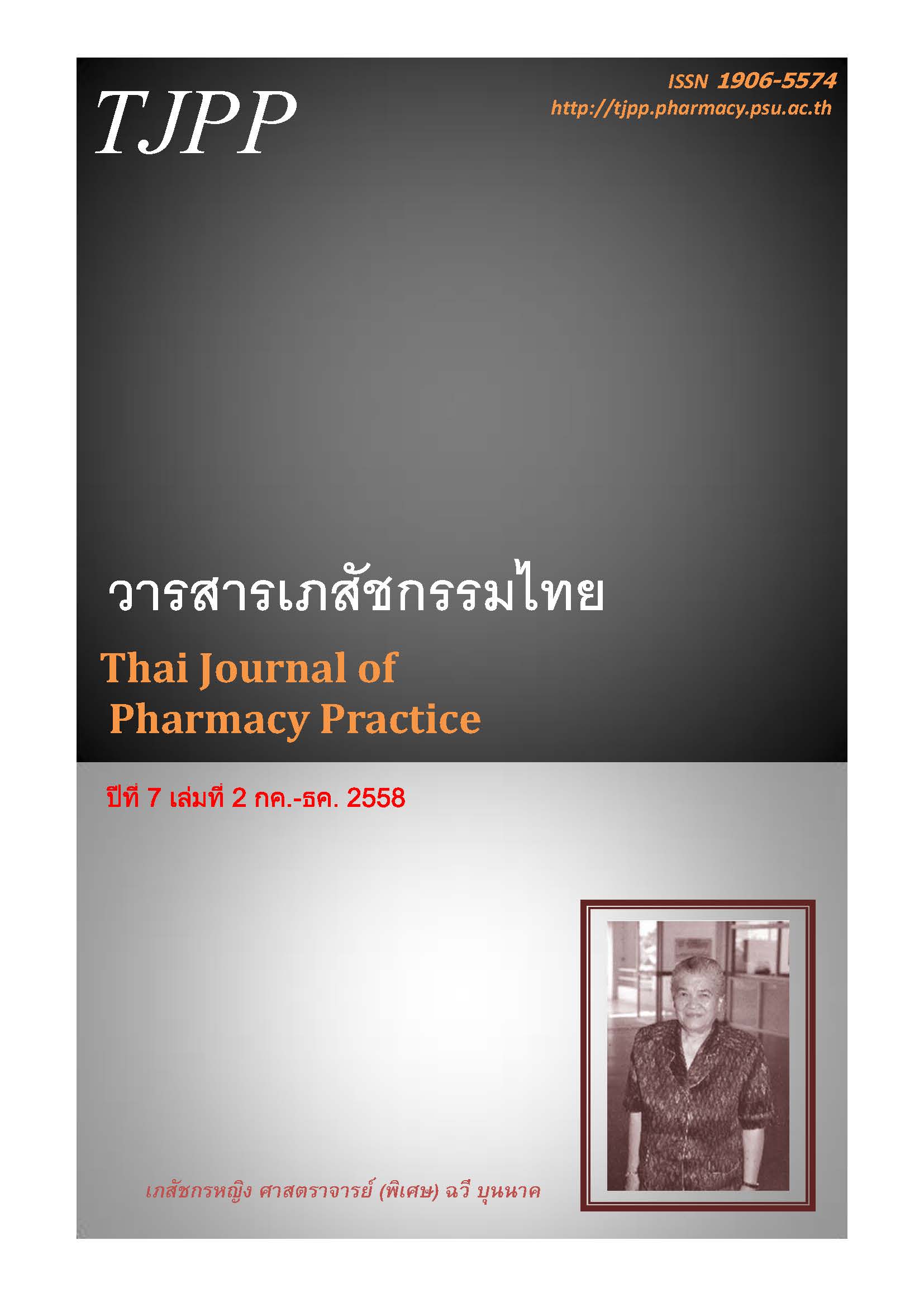ผลกระทบของสถานการณ์ความไม่สงบในสามจังหวัดชายแดนภาคใต้ ต่อการปฏิบัติงานคุ้มครองผู้บริโภคและการปรับตัวของเภสัชกร
Main Article Content
บทคัดย่อ
วัตถุประสงค์: เพื่อบรรยายการปฏิบัติงานคุ้มครองผู้บริโภคของเภสัชกรท่ามกลางสถานการณ์ความไม่สงบในสามจังหวัดชายแดนภาคใต้ในแง่ของผลกระทบและการปรับตัว วิธีการ: ผู้วิจัยสัมภาษณ์เจาะลึกเภสัชกร 13 ท่านที่ทำงานในกลุ่มงานคุ้มครองผู้บริโภคและเภสัชสาธารณสุข สำนักงานสาธารณสุขจังหวัดในพื้นที่สามจังหวัดชายแดนภาคใต้ ที่มีประสบการณ์ในการทำงานคุ้มครองผู้บริโภคในพื้นที่อย่างน้อย 1 ปี จากนั้นใช้การวิเคราะห์เนื้อหาเพื่อวิเคราะห์ข้อมูล ผลการวิจัย: เภสัชกรรับรู้ถึงผลกระทบ 4 ด้านของสถานการณ์ความไม่สงบ คือ 1) ผลกระทบต่อจิตใจ คือ ก่อให้เกิด 1.1) ความเครียด และ 1.2) ความวิตกกังวล กลัวความไม่ปลอดภัย และการสูญเสียบุคคลอันเป็นที่รัก 2) ผลกระทบต่อวิถีชีวิต ก่อให้เกิด 2.1) ความไม่สะดวกในการดำเนินชีวิตตามปกติ 2.2) ความลำบากในการซื้อหาอาหาร และ 2.3) ความไม่สะดวกในการเดินทางและทำกิจกรรมทางสังคม 3) ผลกระทบต่อความสัมพันธ์ทางสังคม คือ ก่อให้เกิดความหวาดระแวงและไม่ไว้วางใจซึ่งกันและกันในกลุ่มเพื่อนร่วมงานหรือประชาชนที่ต่างศาสนาและวัฒนธรรม และ 4) ผลกระทบต่อการปฏิบัติงาน คือ ก่อให้เกิด 4.1) ไม่สามารถปฏิบัติงานได้อย่างเต็มที่เนื่องจากข้อจำกัดเรื่องความปลอดภัย 4.2) ขาดแคลนเภสัชกร และ 4.3) ภาระงานมากขึ้น แนวทางที่เภสัชกรใช้ลดผลกระทบจากสถานการณ์ความไม่สงบแบ่งได้เป็น 3 ประเภท 1) แนวทางก่อนปฏิบัติงาน ได้แก่ 1.1) ติดตามสถานการณ์และปรับเปลี่ยนแผนการทำงานตามสถานการณ์ในพื้นที่ 1.2) ประสานกับผู้รับผิดชอบงานในพื้นที่ก่อนลงปฏิบัติงานในพื้นที่1.3) วางแผนการปฏิบัติงานอย่างรอบคอบ 1.4) ศึกษาหาข้อมูลของพื้นที่และบุคคลที่เกี่ยวข้องในพื้นที่ 1.5) รายงานผู้บังคับบัญชาก่อนลงพื้นที่ปฏิบัติงาน 1.6) เน้นการปฏิบัติงานในงานประจำและงานเชิงตั้งรับมากกว่างานในเชิงรุก และ 1.7) ถ่ายโอนงานให้พื้นที่เป็นผู้ปฏิบัติงานมากที่สุด 2) แนวทางขณะปฏิบัติงาน ได้แก่ 2.1) ปฏิบัติงานในพื้นที่โดยยึดหลักความปลอดภัย2.2) อดทน พยายาม 2.3) ซื่อสัตย์ โปร่งใส ตรงไปตรงมา 2.4) มีสมรรถนะทางวัฒนธรรม 2.5) คิดเชิงบวก และ 2.6) รู้จักปล่อยวางและ 3) แนวทางหลังปฏิบัติงาน คือ การหาวิธีจัดการความเครียด สิ่งที่ส่งเสริมให้เภสัชกรยังคงปฏิบัติงานอยู่ในพื้นที่สามจังหวัดชายแดนภาคใต้ คือ1) การเป็นคนในพื้นที่ 2) ความสัมพันธ์กับผู้บังคับบัญชาและเพื่อนร่วมงาน 3) ค่าตอบแทนและสวัสดิการที่ได้รับ 4) การมีแบบอย่างที่ดีและ 5) การเห็นคุณค่าในงาน สรุป: ผลกระทบจากสถานการณ์ความไม่สงบทำให้ภาวะสมดุลในชีวิตของเภสัชกรเสียไป แต่หากเภสัชกรรับรู้สถานการณ์ตามความเป็นจริงว่าผลกระทบที่เกิดสามารถแก้ไขหรือบริหารจัดการได้ ใช้วิธีการแก้ปัญหาที่เหมาะสมเพื่อลดผลกระทบจากความไม่สงบ และได้รับการช่วยเหลือจากระบบเกื้อหนุนค้ำจุนอย่างเหมาะสมแล้ว ผลกระทบจากสถานการณ์ความไม่สงบจะถูกแก้ไขบรรเทา ชีวิตของเภสัชกรจะกลับเข้าสู่ภาวะสมดุลครั้งใหม่ และไม่เกิดภาวะวิกฤติ ทำให้สามารถดำรงชีวิตและปฏิบัติงานท่ามกลางสถานการณ์ความไม่สงบต่อไปได้ ผลการวิจัยสามารถใช้เป็นข้อมูลสำหรับผู้กำหนดนโยบายในการวางแผนเพื่อให้เภสัชกรผู้เสียสละปฏิบัติงานในเขตสามจังหวัดชายแดนใต้เกิดการรับรู้ว่าผลกระทบของสถานการณ์ว่าสามารถแก้ไขหรือบริหารจัดการได้ และสามารถใช้กลวิธีต่าง ๆ และระบบเกื้อหนุนเพื่อลดผลกระทบดังกล่าว
Article Details
ผลการวิจัยและความคิดเห็นที่ปรากฏในบทความถือเป็นความคิดเห็นและอยู่ในความรับผิดชอบของผู้นิพนธ์ มิใช่ความเห็นหรือความรับผิดชอบของกองบรรณาธิการ หรือคณะเภสัชศาสตร์ มหาวิทยาลัยสงขลานครินทร์ ทั้งนี้ไม่รวมความผิดพลาดอันเกิดจากการพิมพ์ บทความที่ได้รับการเผยแพร่โดยวารสารเภสัชกรรมไทยถือเป็นสิทธิ์ของวารสารฯ
เอกสารอ้างอิง
2. Bureau of Policy and Strategy, Office of Permanent Secretary, Ministry of Health. Public health statistics [online]. 2009 [cited 2013 Oct 22]. Available from: URL: http://bps.ops.moph.go.th/E-book/ebook.html
3. Kulsomboon V, Sriwiriyanuparb W. Consumer protection. In: Kanjanajitra C, et al., editor. Thai health in 2007. Bangkok: Amarin Printing and Publishing; 2007.
4. Chaosuansreecharoen P, Ruangdej K, Sungkeao S, Samaae S. Factors influencing happiness at work among health personnel in the three southern border provinces of Thailand. Journal of Nursing and Education 2012; 5: 14-7.
5. Panusnashe S, et al. Statistics on unrest situation within southern border provinces in 2014: year with the smallest numbers of events within 11 years. Deep South Watch [online]. 2014 [cited 2015 Apr 24]. Available from: URL: http:// www.deepsouthwatch.org/node/6596
6. Buddhachart P. Factors influencing quality of life of physicians in the three southern border provinces of Thailand. Songkla Med J 2007;25: 29-37.
7. Kraonual S, Hatthakit U, Boonyasopun U. Meanings, feeling, motivation and conditioning factors of nurses’ practice on the unrest situations of the three southern border provinces. Thai Journal of Nursing Council 2009; 24: 64-77.
8. Sirisuwan S, Kimakhom J, Asonknew W, Asonknew W. Impacts on health services in crisis within three southern border provinces. Nontaburi: Health Service Research Institute; 2005.
9. Hasuwannakit S. Southern crisis and impacts on health system within three southern border provinces. Journal of Community Hospitals 2004; 5: 9-16.
10. Uthaiphan P, Deraman A, Phungtananiwankul B, Khatkhamhaeng S. Study on the impacts on services of pharmacists and approaches for managing the problems on service provision within the crisis in three southern border provinces [online]. 2004 [cited 2013 Oct 22]. Available from: URL:http://kb.hsri.or.th/dspace/handle/11228/1225.
11. Boonyoung N, Rattanasskul N, Dangsuwan K, Phongsuwan C. Experiences of nurses from hospitals in Narathiwat province for referring clients under the unrest situation in three southern border provinces. 12th Region Medical Journal 2007; 18: 25-35.
12. Setavatcharavanich S. Professional nurses' empowerment in a regional hospital during terrorism in three border provinces, southern Thailand [independent study]. Songkhla: Prince of Songkla University; 2006.
13. Aongsawang A, Nilrat N, Jeng K, Limtaweekul N. Stress and adaptation among health workers on unrest situations in three southern border provinces. 12th Region Medical Journal 2004; 15: 1-7.
14. Pongsai P. Head nurses' empowerment of registered in hospitals during the situation of unrest in the three border provinces in southern Thailand: nurses' perception [independent study]. Songkhla: Prince of Songkla University; 2006.
15. Mile MB, Huberman AM. Qualitative data analysis: an expanded sourcebook. 2nd ed. Thousand Oaks, CA: Sage; 1994.
16. Narathiwat Statistics Office. Provincial statistics report in 2008. Narathiwat: Narathiwat Statistics Office; 2008.
17. Southern Office of the National Economic Development Board. Education development in 3 southern border provinces. Southern Development News 2012; 4: 1-5.
18. ASTV Online Manager. Gun raid killed a 3 month 9999pregnant public health worker and one seriously injured. Southern News: ASTV Online Manager [online]. 2013 [cited 2015 Apr 24]. Available from: URL: http://www.manager.co.th/ South/ViewNews. aspx?NewsID=9570000047730.
19. Kanchanakorn M. Essential and present competencies of pharmacists who enforce consumer protection law under the Drug Act B.E. 2510 in the Northern region. [master thesis]. Chiangmai: Chiangmai University; 2006.
20. Aguilera DC, Messick JM. Crisis intervention: theory and methodology. St. Louis, Missouri: CV Mosby and Co; 1974.
21. Nuanpian S, Thongsuk P, Peeravud J. Work effects on emergency nurses and safety management of head nurses under the unrest situation in community hospitals, three southern border provinces of Thailand. KKU Journal for Public Health Research 2013; 6: 81-90.
22. Lazarus RS, Folkman S. Stress, appraisal, and coping. New York: Springer; 1984.
23. Sutheravut P, Rodklai A, Wiriyapongsukit S, Hasuwannakit S. Health system during crisis in restive southern provinces of Thailand. Journal of Health Systems Research 2007; 1: 145-54.
24. Kraonual S. Nurses’ practice experiences in the unrest situation in the three southern border provinces [master thesis]. Songkhla: Prince of Songkla University; 2008.
25. Becker H, Carper J. The development of identification with an occupation. Am. J. Sociol. 1956; 289-98.
26. Pender NJ. Health promotion in nursing practice. 3rded. Stamford, CT: Appleton &Lange; 1996.
27. Choocheep K. Quality of work life of the civil servants in the southernmost provinces of Thailand [master thesis]. Bangkok: National Institute of Development Administration; 2008.
28. Herzberg F, Mausner B, Snyderman BB. The motivation to work. 2nded. New York: John Wiley & Sons; 1959.
29. Bandura A. Self-efficacy: toward a unifying theory of behavioral change. Psychol Rev 1977; 84: 191-215.


